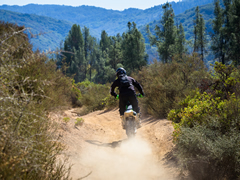BLM's Ukiah Field Office Invites Public Comments on OHV Grant Application
Organization:
BLM Office:
Media Contact:
 UKIAH, Calif. – The Bureau of Land Management's (BLM) Ukiah Field Office is inviting public comments on its draft grant applications to the state of California's Off-Highway Motorized Vehicle Recreation Division. The field office is requesting funds to be used for calendar year 2018 for trail maintenance, law enforcement and operations and maintenance of off-highway vehicle areas.
UKIAH, Calif. – The Bureau of Land Management's (BLM) Ukiah Field Office is inviting public comments on its draft grant applications to the state of California's Off-Highway Motorized Vehicle Recreation Division. The field office is requesting funds to be used for calendar year 2018 for trail maintenance, law enforcement and operations and maintenance of off-highway vehicle areas.
An open house to discuss the OHV grants is scheduled from 5: 30 to 7 p.m., Wednesday, February 22, at Slam Dunk Pizza, 720 North State St., Ukiah.
The grant applications, along with those from other BLM field offices, will be available online March 7 at www.ohv.parks.ca.gov. For more information on the grant applications, please contact Amanda James, BLM Ukiah Field Office manager at (707) 468-4000, or from Michael Lightner, park ranger, (707) 468-4065 or email [email protected].
Comments must be submitted by close of business, April 3 to the OHMVR Division at www.ohv.parks.ca.gov to be included with the grant request. For more information, contact: Sarah Mathews or Michael Lightner, (707) 468-4000.
The OHVMR grants and cooperative agreements program supports well-managed off-highway vehicle recreation in California by providing financial assistance to cities, counties, districts, federal agencies (including BLM), state agencies, educational institutions, federally recognized Native American Tribes and non-profit entities. Information on the grant program is available at www.ohv.parks.ca.gov.
The BLM manages about 245 million acres of public land located primarily in 12 western states, including Alaska, on behalf of the American people. The BLM also administers 700 million acres of sub-surface mineral estate throughout the nation. Our mission is to sustain the health, diversity, and productivity of America’s public lands for the use and enjoyment of present and future generations.
